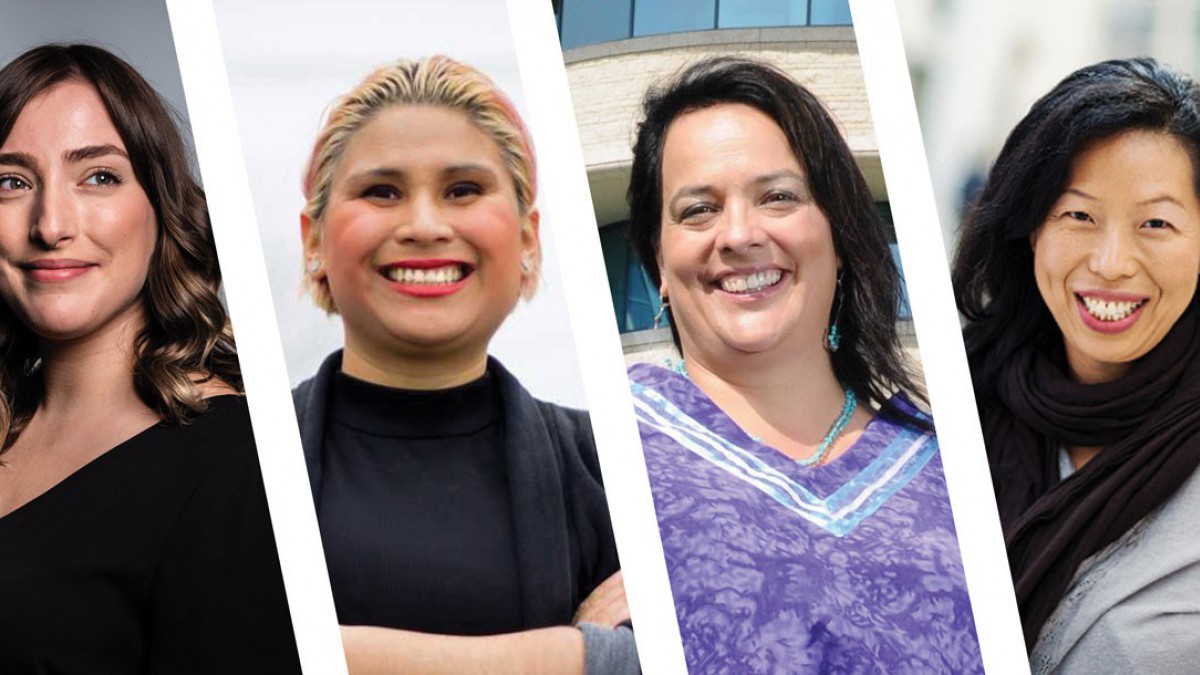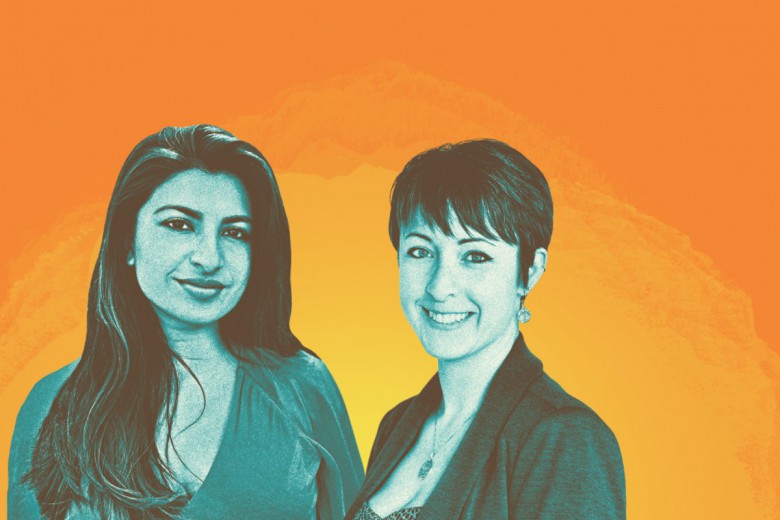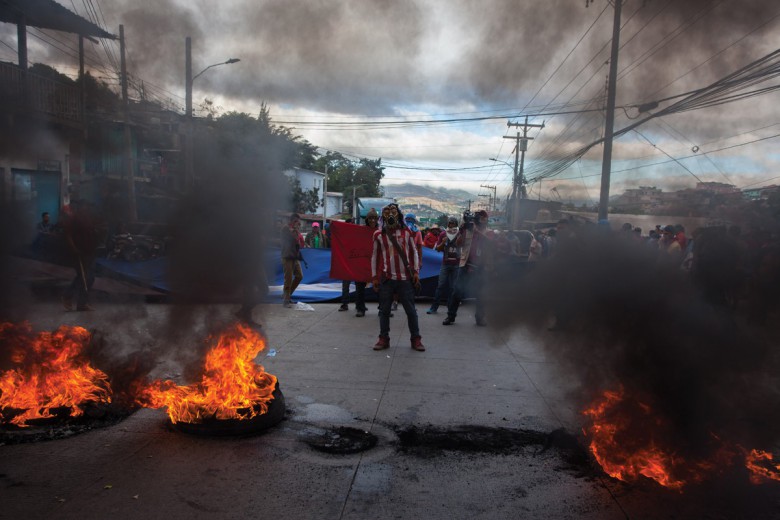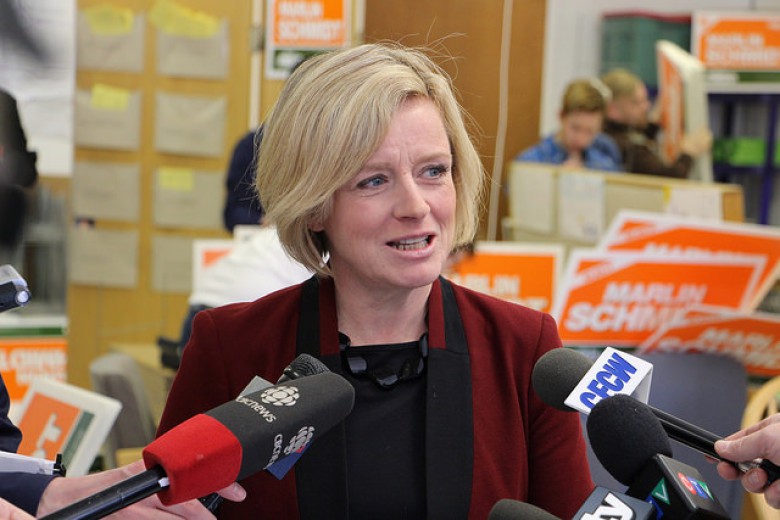On November 26, 2018, a packed elementary school gym in Edmonton, Alberta, is charged with excitement. It’s the NDP nomination meeting for the contested federal candidacy in Edmonton-Strathcona, where Paige Gorsak waits to hear the results of her campaign. The NDP riding association only planned for a maximum of 200 people, so hundreds of young mothers with strollers, seniors, and oilpatch workers stand impatiently at the back and line the school hallways. Gorsak, then a 26-year-old master’s student and co-founder of Climate Justice Edmonton who ran an openly socialist campaign, makes her speech to a room full of people who are genuinely excited about electoral politics – many for the first time in their lives. In her five-week campaign, her team raised $5,000, gained over 100 volunteers, and boosted the NDP membership by over 25 per cent. Slowly, the NDP members cast their ballots. The vote is in: Gorsak loses by only 19 votes.
I watched Gorsak’s campaign explode on social media, and saw friends from the campaign fight for a woman who defies the centrist standard of electoral politics. I had recently begun volunteering with the Green Party in my home province of Prince Edward Island and had been struggling with the classic questions any young leftist must face when considering electoral politics. Can we change systems from within? Can reform be meaningful or is it a distraction from revolution? Is voting as harm reduction strategic or cynical?
Six months after her landmark campaign, I interviewed Gorsak about why she decided to get involved in electoral politics. Like me, Gorsak had grappled with the usefulness of electoral politics and the ethics of working within colonial governance systems.
“We struggled to figure out how electoral politics fit into our long-haul endgame and whether it was the right tactic and path for us,” she admits. “Ultimately we decided to see it in that way, as a tool for the larger change that we were working towards. But I think a lot of us feel pretty jaded around electoral politics.”
Gorsak is part of a swelling wave of women activists – many of whom are young women of colour – who are setting out to transform the Canadian government from within. As the federal election approaches in the fall, I wanted to understand their decision to pivot from community organizing to electoral politics.
“Ultimately we decided to see it in that way, as a tool for the larger change that we were working towards. But I think a lot of us feel pretty jaded around electoral politics.”
“I think it’s really important to mention that when we talk about government, that’s a very different understanding of what government is and what government does,” explains Min Sook Lee, who was recently nominated as the NDP candidate for Toronto-Danforth in the upcoming federal election. She’s also an award-winning filmmaker, an assistant professor at the Ontario College of Art and Design (OCAD), and has organized with the Asian Canadian Labour Alliance and Camp Sis.
Lee grew up as a working-class South Korean immigrant in Toronto in the 1970s. She tells me that electoral politics had never been on her agenda, even after decades of work as a community organizer. When I asked Lee why she decided to run for the NDP, her answer was simple: her children.
“I remember when I was a kid and all the ways in which racism and sexism and poor-bashing made me feel less-than and made me feel I had something to be ashamed of, or that I needed to disappear. Those are horrifying [thoughts] for a child,” Lee recalls. “When I saw Trump rising before he was voted in […] that hit home for me – and I never want my children to go back to what I lived in, that central core fear I always had.”
The urgency of building a better world for future generations is also what brought Racelle Kooy to the federal Green Party. A member of the Samahquam First Nation who was forced to evacuate her home during the 2017 B.C. wildfires, Kooy was asked by the Green Party to run as a candidate in her new home of Victoria for the federal election this fall.
“What we do as individuals are little drops in the bucket. It’s about consolidating power to become that conscience, to make that change,” Kooy says. “When we explain to people that the status quo won’t do and won’t solve [the climate crisis] we’re facing 11 years from now, it’s the job of individuals to come together and become the collective conscience.”
“What we do as individuals are little drops in the bucket. It’s about consolidating power to become that conscience, to make that change.”
Kooy first became interested in the Green Party while protesting the KGHM Ajax Mining Project – both the B.C. Green caucus and a number of First Nations groups in B.C. opposed the copper and gold mine that was to be built near Kamloops. She was later invited to co-chair the national Green Party convention, which solidified her commitment to the party.
As a community engagement specialist, Kooy was a facilitator in many Canadian government-First Nations forums, including the Missing and Murdered Indigenous Women and Girls Pre-Inquiry input process for the Assembly of First Nations (AFN).
While she believes dialogue between settler governments and First Nations is valuable, she has grown frustrated with the federal government’s lip service. In the last calendar year alone, Trudeau’s Liberals purchased a multi-billion dollar pipeline, sent armed police to invade the unceded territory of the Wet’suwet’en in order to build another pipeline, and have made little progress on Trudeau’s promise to bring clean drinking water to all First Nations by 2021.
“We make inroads, but it isn’t enough,” she notes. “We have a narrative around climate change and we have a pipeline. We have a narrative about the most important relationship and we have an absolute shunning of free, prior, informed consent about resource extraction.”
Barriers and bias
And while more and more women are putting their names forward in electoral politics, they often face seemingly insurmountable barriers from their constituents and from political parties themselves.
Graciela Hernández-Cruz recently ran for the NDP nomination in Ottawa Centre. Hernández-Cruz grew up in Guatemala with a single mother who, she tells me, always inspired her to advocate for justice. A queer feminist organizer, she has worked with organizations like ACORN, an anti-poverty network, and PowerShift, a youth climate justice organization.
Living in Environment Minister Catherine McKenna’s riding, she was frustrated by the inaction of the federal government on climate change. Hernández-Cruz said she doesn’t identify with any one political party, but she ran for the NDP nomination in order to put forward a radical vision of the future.
“We understood that the NDP needs a very strong, bold climate action platform. […] We ran on respecting UNDRIP [the United Nations Declaration on the Rights of Indigenous Peoples], on a just transition for workers, 100 per cent renewable energy by 2035, as well as housing as a human right, drug decriminalization, basic income, access to basic mental health services, less police oversight, and more criminal justice reform. All of it was a pretty radical vision, and was not about settling for the status quo.”
Hernández-Cruz, who ultimately lost the nomination by a narrow margin, wanted to represent a very different kind of voice than we traditionally see in politics and push the NDP in Ottawa further left.
“I think the reason why I said ‘fuck it, I’ll do it’ was because I felt like in Ottawa Centre, a lot of the radical organizing and leftist political organizing is a lot of men – a lot of white men – and I feel like a lot of support that we throw after the left, especially in terms of who the NDP throw their support after, are white men and I was frankly like, ‘this is bullshit!’”
According to Hernández-Cruz, during her campaign there were “definitely online comments related to [… my] race, class, gender, sexuality, age. That maybe I shouldn’t be running in Ottawa ’cause it’s not my place to be.”
“I think the reason why I said ‘fuck it, I’ll do it’ was because I felt like in Ottawa Centre, a lot of the radical organizing and leftist political organizing is a lot of men”
And she said she felt like the “old guard” of the NDP was hostile to her radical proposals. The vetting process stood out as a source of tension between her and the local riding association.
“I had a really hard time being vetted because of my politics, because of what I believe. I believe in justice for Palestine and that was not something [the vetting committee] was super on board with. Just getting approved, that’s a huge process over many weeks when I couldn’t do any [campaigning] because I wasn’t official [… i]t was interesting to see that, yeah, spaces of power have been restricted to specific people for specific reasons.”
The NDP has a history of barring pro-Palestine candidates. Paul Manly, for example, was rejected from running for the NDP in 2014 after he publicly defended his father, who was arrested by Israeli authorities while on a humanitarian mission to Gaza in 2012. In May, Manly ran and won for the Greens on Vancouver Island in the Nanaimo-Ladysmith byelection – even though the Greens have their own disappointing history with refusing to endorse the boycott, divestment, and sanctions (BDS) call from Palestinian civil society.
The respectability politics embedded in vetting processes are one way that activists are deterred or even barred from running for election. Contestants for candidacy are typically asked to undergo a social media background search, as well as answer questions about their past appearances in the media, employment history, group and organization affiliations, and their criminal record or history. Most parties won’t allow a contestant to run if they have done something deemed “immoral” or illegal. And in a country where Indigenous, Black, and poor women are arrested and imprisoned at a higher rate, this can actively bar marginalized women from being able to hold positions of power.
From online harassment and rape threats to vandalized campaign signs and implicit bias against female candidates, women still face systemic gender-based barriers when running for election. Young mothers, for example, are often informally barred from political spaces when parties lack child care policies. Nicole Sarauer, an NDP MLA from Saskatchewan who’s expecting a baby, made headlines in April for her fight to allow babies in the Saskatchewan legislature and to grant MLAs parental leave.
“I had a really hard time being vetted because of my politics, because of what I believe. I believe in justice for Palestine and that was not something [the vetting committee] was super on board with.”
And though women are stepping forward, both the NDP and the Green Party need to do a better job at supporting leftist women candidates materially and politically. It isn’t enough to run token female candidates in ridings without a significant base of support for that party. Women need strong campaign teams, mentorship from party insiders, access to policy analysts, and meaningful consultation on platforms that represent our desire for change.
In some provinces, the NDP has funds that financially support women candidates – for example, the Alberta NDP has the Olga Blondheim fund, and the Saskatchewan NDP has the Bessie Ellis fund. Meanwhile, the B.C. NDP has a policy requiring any departing MLA to be replaced by a woman or “equity-seeking candidate,” including racialized people and members of the LGBTQ+ community. But for the most part, there’s a patchwork of practices across provinces and regions – which means parties generally fail to offer a robust or stable basis of support for marginalized candidates.
“When I started running, the NDP handed me a spreadsheet with, like, 200 names on it and very little contact information and very little local infrastructure,” says Amara Possian, who ran as an NDP candidate for Don Valley West against Kathleen Wynne in the last Ontario provincial election that saw demagogue Doug Ford rise to power. Possian is a Toronto-based climate justice organizer who has led multiple youth delegations to the Conference of the Parties to the United Nations Framework Convention on Climate Change and is currently the Canada campaigns manager for 350.org. Though she was asked to run by the NDP in her riding, Possian tells me there was little existing party infrastructure or material support from the party, since they were focusing their resources on strategic ridings.
Out of that, “we built an unprecedented number of volunteers and donors,” she tells me proudly. While Possian and many other young women grow a party’s presence immensely during campaigns, candidates are expected to dedicate all of their free time to a campaign without financial compensation, which constitutes a barrier to low-income women. Parties should approach and work with candidates long before an election is called in order to provide mentorship and networking opportunities, especially if they don’t have the means to financially support that candidate come election time.
From the inside out
Deciding to run as a Green candidate was not an easy decision for Kooy, as winning her seat would mean working within a system that was created with the intention of dispossessing Indigenous peoples. Before accepting the nomination for her riding, Kooy consulted members of her community and ultimately decided that she could work to move the Green agenda forward for Indigenous rights.
“Do the [Greens] understand Indigenous rights and title fully and wholly? No. Do I understand trans rights or refugee rights and issues fully? No. But we understand that we’ll turn to each other for expertise and will always look for that authentic voice in any area and say ‘what do you need, what will help you?’”
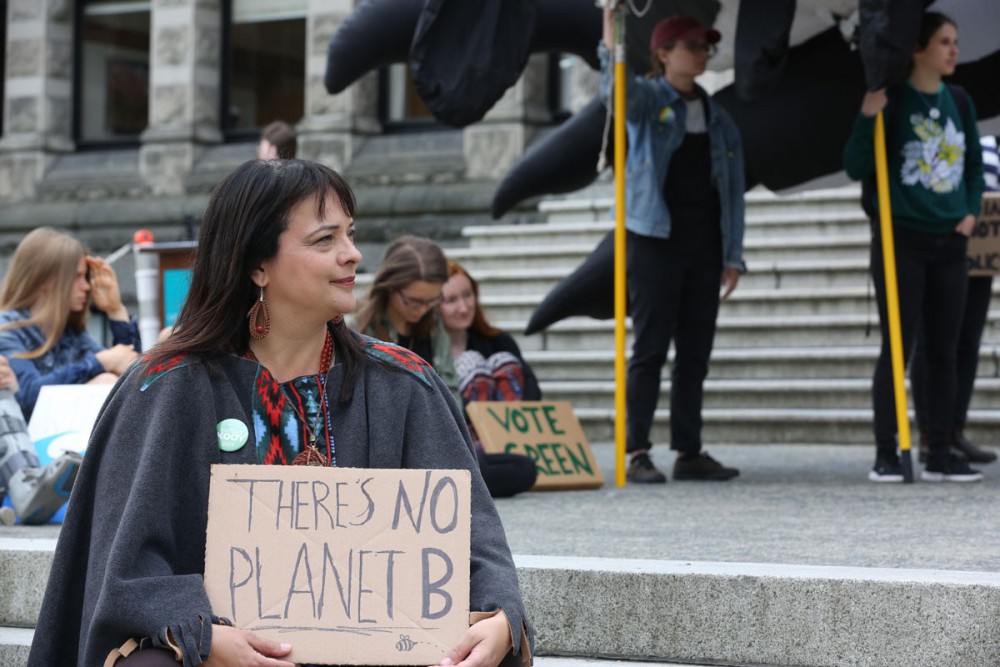
“That request [to run for the NDP] came at a time when I was really thinking a lot about how, on the left, we are very comfortable critiquing power from the outside and much less comfortable holding power accountably and governing in a way that we actually believe in,” Possian tells me. “We do need to build alternatives outside the current political system, but I don’t think that means being completely separate from it. We still have a government with laws that impact people’s lives daily.”
According to Emma Norton, a climate justice organizer who worked to stop the construction of the Energy East pipeline and recently ran for the federal nomination in Dartmouth, N.S., “a lot of power still resides in our colonial system, and if we want to make this [renewable energy transition] as urgently as it needs to be made right now we need to be taking back that power. […] We really do need top-down solutions right now, and I really do believe we’re seeing a change in electoral politics with different young women from across the country stepping up and taking more radical agendas. […] One person in a system can’t change it. But the more people we can get in who are progressive and want to see real change, the better.”
Is it time?
Norton, Gorsak, Hernández-Cruz, and Possian all ran on platforms of anti-poverty and climate justice, wanted to consult communities genuinely on budgeting and other governance decisions, and would have stood up to government forces that protect corporate interests over people. But they didn’t get elected. Most young leftist women who run for office in third parties don’t get elected. It begs the question: are electorates ready to put radical young women in power?
“That request [to run for the NDP] came at a time when I was really thinking a lot about how, on the left, we are very comfortable critiquing power from the outside and much less comfortable holding power accountably and governing in a way that we actually believe in.”
And even when they are elected, it can be hard for women to hold on to their positions. Pundits talk about the “glass cliff,” the phenomenon of women being elected as leaders only during periods of crisis or upheaval, being judged more harshly while grappling with a particularly difficult political climate, and then being ousted after one term. This trend haunts women like Alberta NDP leader Rachel Notley, who in April became the seventh female premier to be turfed from office in the past six years. Notley’s term in power focused far more on getting her re-elected than on pushing forward leftist policies – and she still lost, leaving Albertans with meagre gains that Jason Kenney is already starting to repeal.
Can we genuinely change systems of power from within if we can’t get – and keep – our own seat at the table? Does that mean we shouldn’t try?
While all of the women I interviewed ran campaigns with the hope of becoming MLAs or MPs, winning wasn’t a singular goal for any of them. Engaging communities, presenting bold platforms, and pushing the goalposts of electoral politics to the left were their priorities.
“The end goal wasn’t to win, it was to run a campaign that talked about these issues [climate and socio-economic justice] that you don’t hear people talking about. […] It was about movement building. For us, as climate justice organizers, or community organizers in general, the 100-plus volunteers who showed up to the campaign, those are folks that we’re looking into pulling into community organizing,” explains Gorsak.
“The end goal wasn’t to win, it was to run a campaign that talked about these issues [climate and socio-economic justice] that you don’t hear people talking about. […] It was about movement building.”
As I write this piece, my home province of Prince Edward Island just finished an extremely tight, historic election. For the first time in P.E.I. history, the Green Party was leading in the polls heading into an election and Islanders had a genuine third choice – one that advocated for carbon neutrality, a basic income guarantee, and a more equitable economic system. While the Progressive Conservatives ultimately formed a minority government, the P.E.I. PCs are much more centrist than their hard-right counterparts across Canada, and the Greens have formed the first Green opposition in the country. I worked on a joint campaign for Lynne Lund and Trish Altass, two Green women in their 30s who were elected as MLAs. I see firsthand what it could mean to the most vulnerable Islanders to have compassionate, intelligent, strong-willed women elected to our legislature.
Electoral politics is not a recipe where you can simply add women and produce change. From Hillary Clinton to Faith Goldy, we see centrist and right-wing women invoke feminism when it’s convenient, but ultimately run on platforms that throw working-class and racialized women under the bus.
But when leftist women with strong moral convictions, like Lee and Kooy, use their grassroots experience to amplify the voices of and advocate for the marginalized? This can result in meaningful progress. The question in the upcoming federal election will be: are voters ready for it?
The decisions that our provincial and federal governments make on a daily basis intimately impact the lives of the most marginalized among us. A few days after the meeting where Lee won her nomination, she tweeted, “As the official #NDP federal candidate for Toronto-Danforth I make one promise: I will be an activist Member of Parliament.” Electoral politics can be one of many tools that leftists use to fight for our future.
The right has always used electoral politics as a tool of oppression, and has vast experience operating political machinery designed to get right-wing candidates elected. We cannot afford to let the right, including Andrew Scheer’s Conservatives, have electoral politics.
“Absconding from institutions of power means we’re abandoning them to those who then write our stories for us,” explains Lee. “I refuse to do that.”


